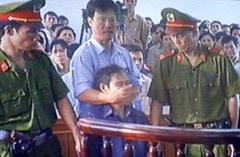Just when all roads are leading to Southeast Asia's rising star, investors are advised against rushing in until a few things are sorted out
NOLAN CRAWFORD
Thailand has cause for concern when looking at competition with regional neighbours such as Vietnam, which has the benefit of a government virtually unified in the direction of public policy, a cheap and young labour force, and well-drawn out plans to invest billions of dollars in infrastructure and industry from now until 2010. But as in any good fairy tale, there are real problems that need to be addressed.
Topping the list is government corruption.
Since June 2006, officials have been implementing the Anti-Corruption Law, a National Assembly-approved policy to clean house. To date, 33 major investigations have turned up 1.6 trillion dong (about US$5.5 million) in misappropriated funds. Despite the good intentions, the law falls short of accomplishing its primary goal, which was at the centre of a recent debate at a National Assembly Standing Committee meeting.
Trang A. Pao, chairman of the National Council, said that attempts to enforce the law were inadequate, with the number of cases and prosecutions far too few to make a real dent in solving the problem.
Government strategies and measures to tackle what has been called an epidemic by local news media are too vague and do not approach the issue in a practical way, said Pao, who was supported during the debate by other senior officials.
The added complication is that widespread corruption can erode business confidence if left unchecked, and could eventually curb foreign direct investment that was valued at a record $10.2 billion last year.
There are signs that officials are moving to further crackdown on corruption, including comments by Prime Minister Nguyen Tan Dung that cases should be carried out as swiftly and as transparently as possible.
The prime minister last month asked the Ministry of Public Security to promptly investigate allegations that Nguyen Dinh Than, a director at state-owned Vinaconex, accepted bribes after he was found with 200 million dong, supposedly a kickback from a local contractor.
In addition, three of the nine decrees to fully implement the Anti-Corruption Law have been passed, with the fourth likely to be approved ahead of the 12th National Assembly election in May.
The draft decree requires candidates to declare their incomes and total assets before running for an assembly seat, somewhat ironic considering Thailand's former prime minister Thaksin Shinawatra had a similar problem.
A second issue that has the potential to hit the economy is Vietnam's unskilled labour force. Though the government reports a literacy rate of around 90%, statistics show that only a fraction of the workforce is qualified to handle mid- to senior-level management positions.
In a study of 63,000 companies released late last year by the Ministry of Planning and Investment, it was found that fewer than 3% of business owners had post-graduate degrees, and 43.3% of managers did not have high-school diplomas.
"It is easy to find people to work for you [in Vietnam], but it is sometimes harder to find the right person," said a member of the Thai Business Association (TBA), who requested anonymity, at a meeting this week in Ho Chi Minh City. He added that not only did a local employee need to handle managerial responsibilities, but also he or she must be ready to work in a multi-cultural environment, which even for a seasoned businessman is not always easy.
The alternative for Thai and other foreign companies is to bring in expatriates, who tend to cost more than hiring somebody locally.
Vietnamese officials hope the managerial issue can be solved with greater public spending on improving national education and by convincing overseas Vietnamese to come back, bringing their expertise with them.
In the government's 2006-10 development plan, there are steps to send teachers back for retraining, improve curricula at schools and universities, and allow foreign higher-education institutions to establish local campuses.
Education ministers are also proactively tackling the issue of corruption and cheating on national placement exams; most recently imposing stricter controls on registering for exams and tightening test question selection procedures to ensure answers are not leaked to students.
A third factor, which may have a more immediate impact on the economy, is the potential energy shortage. The state utility Electricity of Vietnam (EVN) is already warning of blackouts soon.
EVN general director Pham Le Thanh recently told senior government officials that there could be a 140-million- unit (kilowatt/hour) shortage from now until May, due to low water levels at hydroelectric plants; the country's coal and gas generators are already working at maximum capacity.
The shortage is also being driven by higher than expected growth in energy demand, which was up 20% last year, compared to the 16% the state utility predicted. EVN is attributing the higher demand not only to households, but also to rapid industrial growth, with the Vietnamese economy last year growing by 7.5% to 8.5%, depending on whose figures you believe.
In a March 2 report, Thanh Nien Daily News wrote that EVN officials were contemplating buying electricity from China. EVN has also created 11 task forces to investigate ways to reduce energy use.
Vietnam certainly has enough of its own natural resources. With about 40 billion tonnes of coal in the Red River Delta and about 18.5 million tonnes of crude oil and six billion cubic metres of natural gas, the country is an exporter of energy commodities, but does not necessarily have the processing capacity to turn it into electricity.
There are plans for new hydroelectric power plants to come on line in 2007 with more in the pipeline over the next five years, which should help alleviate pressure on the national grid.
Despite these problems, Vietnam remains for the most part a positive investment prospect.
Indeed, its development has been most outstanding next to China and India, and hence it is important to co-operate [with Vietnamese businesses], said Vijit Supinit, the chairman of the Stock Exchange of Thailand (SET), at the TBA meeting on Tuesday.
SET officials were in Vietnam's southern hub to work with local businesses and further develop its relationship with market regulators at the fast-growing HCM City Securities Trading Centre, which continued to hit record highs this week despite global stock market trends.






No comments:
Post a Comment